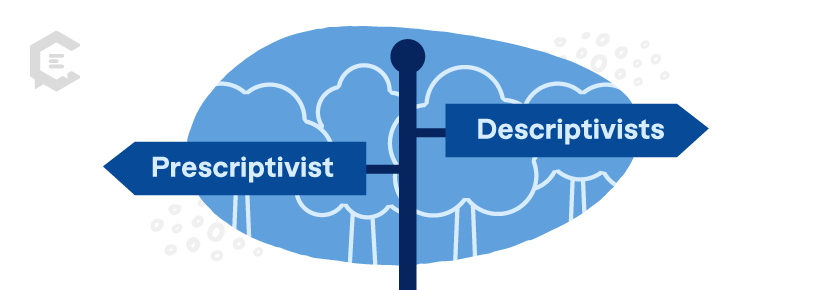While texting and verbal slang are widely accepted in many scenarios, your grammar skills will set you apart in professional settings. Poor grammar skills, fairly or unfairly, can taint you or your brand’s credibility and have an impact on the way others perceive you or your brand.
The 3 types of grammar people
1. Purists.
Known as “prescriptivists” in linguistics circles, these people know and appreciate (sometimes to a fault) the rules of grammar. The purist believes definite rules govern correct usage and failure to follow these rules renders the content in question wrong. These are the ones you go to when you’re not sure if it should be “who” or “whom” and which spelling is English vs. British. Purists have a tendency to believe that poor grammar heralds the fall of civilization.
It’s hard to take someone seriously when they leave you a note saying, “Your ugly.” My ugly what? The idiot didn’t even know the difference between your and you’re. — Cara Lynn Shultz, Author of ‘Spellcaster’
The rule is: Don’t use commas like a stupid person. I mean it. — Lynne Truss, Author of ‘Eats, Shoots, & Leaves: The Zero Tolerance Approach to Punctuation’
People who cannot distinguish between good and bad language, or who regard the distinction as unimportant, are unlikely to think carefully about anything else. — B.R. Myers, Author of ‘A Reader’s Manifesto: An Attack on the Growing Pretentiousness in American Literary Prose’
2. Rebels.
Aka “descriptivists,” these well-intentioned folks are more concerned with how people use language than the alleged rules that govern it. They are far too hip and enlightened to be caught up in all your pesky rules — grammar belongs to the people, and as such, common usage reigns supreme. These folks are fond of using words like “normative” in a sentence whenever possible.
When your last breath arrives, grammar can do nothing. — Adi Shankaracharya, Indian Philosopher
A fellow SNOOT I know likes to say that listening to most people’s English feels like watching somebody use a Stradivarius to pound nails: We are the Few, the Proud, and the Appalled at Everyone Else. — David Foster Wallace, Author of ‘Consider the Lobster and Other Essays’
It never ceases to amaze me how prosaic, pedestrian, unimaginative people can persistently pontificate about classical grammatical structure as though it’s f***ing rocket science. These must be the same people who hate Picasso, because he couldn’t keep the paint inside the lines and the colors never matched the numbers. — Abbe Diaz, Author of ‘PX This. (diary of the “Maître d’ to the Stars”)’
3. Don’t-know-don’t-care.
This one should be self-explanatory, but what the heck: For whatever reason, these people don’t know the rules of grammar or can’t keep them straight, and they don’t understand the big deal, either. You’ll find these people rolling their eyes often and adding, “What’s the big deal? You know what I meant,” when they mess up things like affect vs. effect.
What is the big deal? So glad you asked. Let’s get to it.
Good grammar is a brand ambassador.
It doesn’t matter if you’re talking about your personal brand or your business brand — your grammar, spelling, and punctuation represent you in the world. It sends the reader a message about your authority and attention to detail. It’s a trust signal; it says, I do good work. You can feel safe hiring me/buying from me/retaining my services.
Conversely, poor grammar harms your credibility and makes you look careless. In fact, four in 10 job applications are rejected due to poor grammar and spelling, according to the global communication skills company Communicaid. People are going to make judgments on your competence and intelligence based on your grammar, whether they realize it or not — and regardless of whether you think it’s OK for them to do so. Right or wrong, bad grammar hurts your bottom line.
It comes down to this: Anything great is error-free. Period.
Take fewer vs. less, for instance.
Three outdated grammar rules
1. Don’t end a sentence with a preposition.
This misguided notion is a leftover from the rules of Latin grammar, but like payphones, roadmaps and any member of the Kardashian family, it just isn’t relevant anymore. Why? Winston Churchill sums it up: “This is the sort of bloody nonsense up with which I will not put.”
See? That’s ridiculous. Nobody talks that way. This over-application of a real or perceived rule of grammar is called hypercorrection, and it’s usually produced by someone trying to appear formal or educated. In an attempt to apply the rule and be “correct,” the result is incorrect by all modern usage standards.
When shouldn’t you end a sentence with a preposition? When it’s unnecessary to the meaning of the sentence.
For example:
“Where are you going to?” should simply be, “Where are you going?”
2. Don’t split an infinitive.
Infinitives are those two-word verb forms that begin with “to” such as “to read,” “to see” or “to go.” You split them when you insert an adverb in the middle. For example, who remembers the starship Enterprise? Its mission was, in part:
(Interesting side note: That quote — “To boldly go where no man has gone before” — is from the original ’60s series. The more recent and gender-sensitive series replaced “no man” with “no one.” Now back to our regularly scheduled grammar lesson.)
Boldly comes in between to and go, “splitting” it. The idea that these shouldn’t be split most likely originated with Henry Alford, the Dean of Canterbury, and his 1864 book “The Queen’s English,” in which he wrote there was “no good reason” to split the infinitive.
This morphed over time to a hard-and-fast rule that it was incorrect to do so, but it isn’t. Both the Oxford and Merriam-Webster English usage dictionaries have no beef with it, and even Grammar Girl Mignon Fogarty proclaims, “Today almost everyone agrees that it is OK to split infinitives.”
Grammar Girl has ruled. Let’s move on.
3. Don’t begin a sentence with a conjunction.
School children everywhere are getting points off their essays for beginning sentences with “And,” “But,” So” and “Or,” but this is mere grammar superstition. According to the Chicago Manual of Style:
There is a widespread belief — one with no historical or grammatical foundation — that it is an error to begin a sentence with a conjunction such as ‘and,’ ‘but,’ or ‘so.’ In fact, a substantial percentage (often as many as 10 percent) of the sentences in first-rate writing begin with conjunctions. It has been so for centuries, and even the most conservative grammarians have followed this practice.
The origins of this “rule” are more of a mystery than the others. Steven Pinker, author of ‘The Sense of Style: The Thinking Person’s Guide to Writing in the 21st Century,’ thinks it arose from the need to teach children where to break their sentences. Apparently, with no firm guideline and a penchant for feeding misinformation to children, teachers simply said it was incorrect to begin a sentence with a conjunction — and another erroneous grammar rule was born.
And although not everybody believes it’s a conjunction, feel free to begin your sentences with “because” as well. Why? To boldly go where no tyrannical grammar purist has gone before — that’s the mission, people.
Good grammar gets you what you want
Grammar is the groundwork of clear communication. “The better the grammar, the clearer the message, the more likelihood of understanding the message’s intent and meaning,” author William Bradshaw wrote in this Huffington Post article.
And isn’t that why you’re creating content, regardless if it’s a resumé or a blog post or a billboard —aren’t you trying to communicate? We’ve all seen the “Let’s eat Grandma!” and “Stop clubbing baby seals” memes — and sure, they’re getting kind of annoying — but the point remains the same: Good grammar makes content easier to read and understand. Screw this up and you screw up your message.
People don’t have time to try to figure out what you mean. If you’re not clear, they’ll move on to the guy who is.
Language is beautiful and powerful
Humanity, for all its flaws and weaknesses, is a beautiful thing. Who has never been moved to tears by a kind gesture? Who has not gazed in wonder at a starlit night? What’s it all about, anyway — this living and dying, these 70-odd years we spend trying to figure life out?
Language is the tool with which we try to make sense of it all. It’s how we describe and report on ourselves, the world, and our reality. We use it to discern truth, woo partners, topple governments and make peace with our souls. And as such, it deserves our respect. Good grammar honors the power and beauty of words.
So, what’s next?
The best way to master language is to use it. Keep expanding your network and opportunities to grow your freelance career. And if you want a boost, join our Talent Network. We’ll pair you with top brands that match your skills and expertise.









